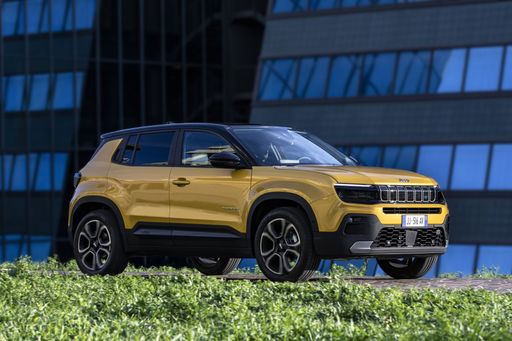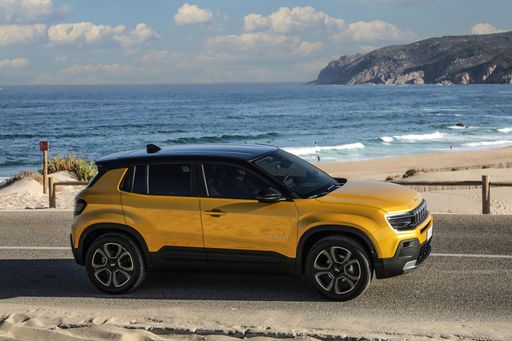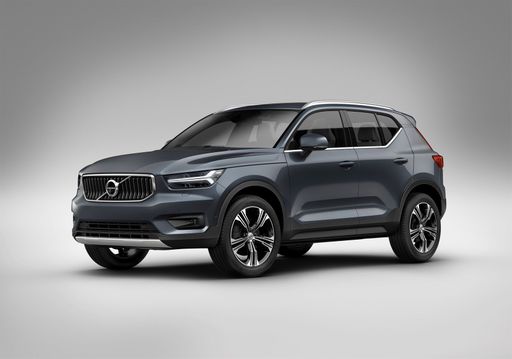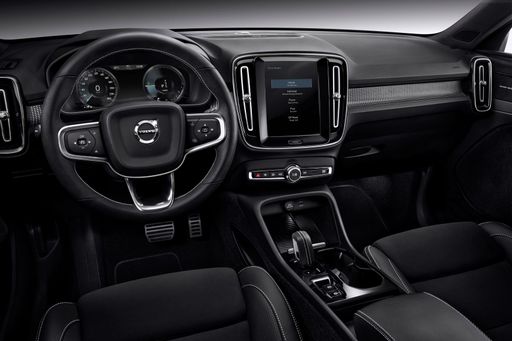Jeep Avenger vs Volvo XC40 - Differences and prices compared
Compare performance (156 HP vs 197 HP), boot space and price (21900 £ vs 36800 £ ) at a glance. Find out which car is the better choice for you – Jeep Avenger or Volvo XC40?
Costs and Efficiency:
When it comes to price and running costs, the biggest differences usually appear. This is often where you see which car fits your budget better in the long run.
Jeep Avenger has a significantly advantage in terms of price – it starts at 21900 £ , while the Volvo XC40 costs 36800 £ . That’s a price difference of around 14820 £.
Fuel consumption also shows a difference: Jeep Avenger manages with 4.90 L and is therefore evident more efficient than the Volvo XC40 with 6.50 L. The difference is about 1.60 L per 100 km.
Engine and Performance:
Power, torque and acceleration say a lot about how a car feels on the road. This is where you see which model delivers more driving dynamics.
When it comes to engine power, the Volvo XC40 has a distinct edge – offering 197 HP compared to 156 HP. That’s roughly 41 HP more horsepower.
In acceleration from 0 to 100 km/h, the Volvo XC40 is a bit quicker – completing the sprint in 7.60 s, while the Jeep Avenger takes 9 s. That’s about 1.40 s faster.
In terms of top speed, the Jeep Avenger performs minimal better – reaching 194 km/h, while the Volvo XC40 tops out at 180 km/h. The difference is around 14 km/h.
There’s also a difference in torque: Volvo XC40 pulls slightly stronger with 300 Nm compared to 260 Nm. That’s about 40 Nm difference.
Space and Everyday Use:
Beyond pure performance, interior space and usability matter most in daily life. This is where you see which car is more practical and versatile.
Both vehicles offer seating for 5 people.
In curb weight, Jeep Avenger is convincingly lighter – 1180 kg compared to 1688 kg. The difference is around 508 kg.
In terms of boot space, the Volvo XC40 offers a bit more room – 452 L compared to 380 L. That’s a difference of about 72 L.
In maximum load capacity, the Volvo XC40 performs hardly perceptible better – up to 1328 L, which is about 51 L more than the Jeep Avenger.
When it comes to payload, Volvo XC40 hardly perceptible takes the win – 532 kg compared to 502 kg. That’s a difference of about 30 kg.
Who wins the race in the data check?
The Jeep Avenger holds a decisive overall lead in the objective data comparison.
This result only shows which model scores more points on paper – not which of the two cars feels right for you.
Costs and Consumption
View detailed analysis
Engine and Performance
View detailed analysis
Dimensions and Body
View detailed analysis

Jeep Avenger
Jeep Avenger
The Jeep Avenger shrinks Jeep's boxy, adventurous styling into a city-friendly electric crossover that looks just as at home on tight streets as it does on muddy weekend lanes. It's a savvy pick for drivers who want go-anywhere attitude without the truck-size ego — practical inside, lively around town and ready to tackle a bit of rough stuff when the mood strikes.
details




Volvo XC40
The Volvo XC40 wraps Scandinavian minimalism into a compact, city-ready SUV with a premium cabin that feels both practical and grown-up. It will suit buyers who prize safety, clever storage and a composed ride, proving that small dimensions don't mean small personality.
details




Costs and Consumption |
|
|---|---|
|
Price
21900 - 36900 £
|
Price
36800 - 47200 £
|
|
Consumption L/100km
4.9 - 5.7 L
|
Consumption L/100km
6.50 L
|
|
Consumption kWh/100km
15.50 kWh
|
Consumption kWh/100km
-
|
|
Electric Range
400 km
|
Electric Range
-
|
|
Battery Capacity
51 kWh
|
Battery Capacity
-
|
|
co2
0 - 129 g/km
|
co2
147 - 148 g/km
|
|
Fuel tank capacity
44 L
|
Fuel tank capacity
54 L
|
Dimensions and Body |
|
|---|---|
|
Body Type
SUV
|
Body Type
SUV
|
|
Seats
5
|
Seats
5
|
|
Doors
5
|
Doors
5
|
|
Curb weight
1180 - 1520 kg
|
Curb weight
1688 kg
|
|
Trunk capacity
325 - 380 L
|
Trunk capacity
452 L
|
|
Length
4084 - 4088 mm
|
Length
4425 mm
|
|
Width
1776 mm
|
Width
1863 mm
|
|
Height
1527 - 1541 mm
|
Height
1652 mm
|
|
Max trunk capacity
1218 - 1277 L
|
Max trunk capacity
1328 L
|
|
Payload
494 - 502 kg
|
Payload
532 kg
|
Engine and Performance |
|
|---|---|
|
Engine Type
Electric, Petrol, Petrol MHEV
|
Engine Type
Petrol MHEV
|
|
Transmission
Automatic, Manuel
|
Transmission
Automatic
|
|
Transmission Detail
Reduction Gearbox, Manual Gearbox, Dual-Clutch Automatic
|
Transmission Detail
Dual-Clutch Automatic
|
|
Drive Type
Front-Wheel Drive, All-Wheel Drive
|
Drive Type
Front-Wheel Drive
|
|
Power HP
100 - 156 HP
|
Power HP
163 - 197 HP
|
|
Acceleration 0-100km/h
9 - 10.6 s
|
Acceleration 0-100km/h
7.6 - 8.6 s
|
|
Max Speed
150 - 194 km/h
|
Max Speed
180 km/h
|
|
Torque
205 - 260 Nm
|
Torque
265 - 300 Nm
|
|
Number of Cylinders
3
|
Number of Cylinders
4
|
|
Power kW
74 - 115 kW
|
Power kW
120 - 145 kW
|
|
Engine capacity
1199 cm3
|
Engine capacity
1969 cm3
|
General |
|
|---|---|
|
Model Year
2023 - 2025
|
Model Year
2024
|
|
CO2 Efficiency Class
A, D, C
|
CO2 Efficiency Class
E
|
|
Brand
Jeep
|
Brand
Volvo
|
What drivetrain options does the Jeep Avenger have?
Available configurations include Front-Wheel Drive or All-Wheel Drive.




